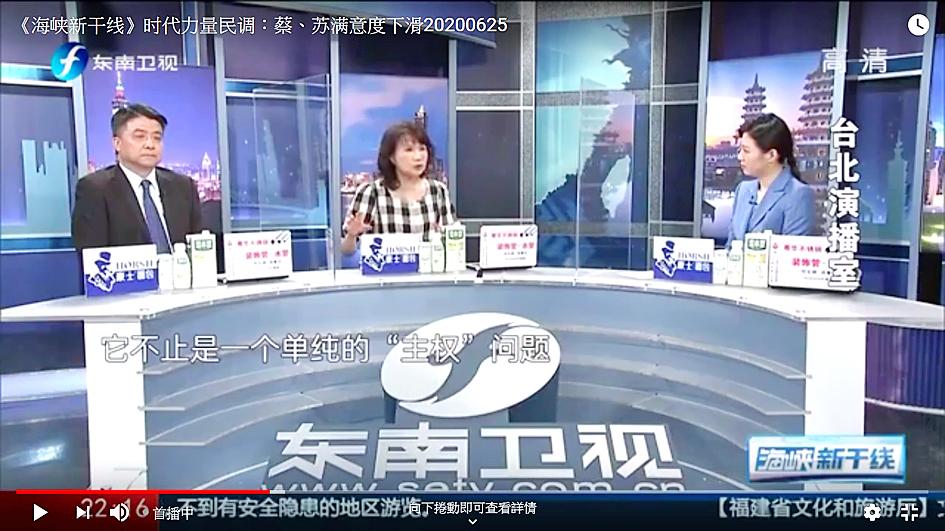Democratic Progressive Party Legislator Chiu Chih-wei (邱志偉) yesterday called on the government to ban Chinese media in Taiwan from producing political shows, saying they degrade the nation and some Taiwanese politicians reportedly tout Beijing’s propaganda through the programs.
During an appearance last month on the China Central Television (CCTV) talk show The Two Sides of the Taiwan Strait (海峽兩岸), Taipei City Councilor Wang Hung-wei (王鴻薇) of the Chinese Nationalist Party (KMT) referred to President Tsai Ing-wen (蔡英文) as “Taiwan’s leader,” terminology frequently used by Beijing.
Wang is also deputy chairwoman of the KMT’s Culture and Communications Committee.

Photo: Screen grab from the Internet
New Party member Chiu Yi (邱毅) last year on the show discussed the deployment of Taiwan’s military missiles, and he later said that the show was produced at a studio in Taiwan.
China-based SETV (東南衛視) and FJTV (海峽衛視), both part of Fujian Media Group, also produce political shows on cross-strait affairs in studios in Taipei.
On the SETV show Haixia Shinkansen (海峽新幹線), which connects to a Taipei-based studio every episode, a Chinese host typically makes opening remarks, and two Taiwanese guests then comment on Taiwan’s politics and parrot Chinese political views, critics have said.
The Mainland Affairs Council has said that Chinese reporters based in Taiwan can rent film studios from Taiwanese media and transmit their shows back to China for broadcasting without government approval.
However, Chinese reporters not stationed in Taiwan must apply to the government before producing shows in the nation, it said.
CCTV and SETV are allowed to station reporters in Taiwan, but FJTV is not, it said.
Chiu Chih-wei said that the council’s standards are too lax, urging it to ensure that the Chinese hosts have work permits and that their shows comply with their government applications.
Beijing tasks Chinese media with collecting intelligence and executing “united front” tactics, and Taiwan’s government should remain vigilant about these activities, he said.
Chinese media are Beijing’s mouthpieces for propaganda that practice self-censorship, so they cannot be viewed as ordinary news outlets that are supposed to produce objective and balanced programming, National Taiwan University journalism professor Flora Chang (張錦華) said.
The government should not treat Chinese reporters as free media workers when planning their management, but should follow the US practice of listing them as official agencies, she said.
The US government on Monday added four Chinese media outlets to a list of organizations that should be considered “foreign missions” because of their ties to the Chinese Communist Party.
“If these outlets are considered government agencies [just as the US sees them], would Taiwanese authorities agree to allow them to establish representative offices in Taiwan?” Chang said.

The brilliant blue waters, thick foliage and bucolic atmosphere on this seemingly idyllic archipelago deep in the Pacific Ocean belie the key role it now plays in a titanic geopolitical struggle. Palau is again on the front line as China, and the US and its allies prepare their forces in an intensifying contest for control over the Asia-Pacific region. The democratic nation of just 17,000 people hosts US-controlled airstrips and soon-to-be-completed radar installations that the US military describes as “critical” to monitoring vast swathes of water and airspace. It is also a key piece of the second island chain, a string of

A magnitude 5.9 earthquake that struck about 33km off the coast of Hualien City was the "main shock" in a series of quakes in the area, with aftershocks expected over the next three days, the Central Weather Administration (CWA) said yesterday. Prior to the magnitude 5.9 quake shaking most of Taiwan at 6:53pm yesterday, six other earthquakes stronger than a magnitude of 4, starting with a magnitude 5.5 quake at 6:09pm, occurred in the area. CWA Seismological Center Director Wu Chien-fu (吳健富) confirmed that the quakes were all part of the same series and that the magnitude 5.5 temblor was

Taiwan will now have four additional national holidays after the Legislative Yuan passed an amendment today, which also made Labor Day a national holiday for all sectors. The Chinese Nationalist Party (KMT) and Taiwan People’s Party (TPP) used their majority in the Legislative Yuan to pass the amendment to the Act on Implementing Memorial Days and State Holidays (紀念日及節日實施辦法), which the parties jointly proposed, in its third and final reading today. The legislature passed the bill to amend the act, which is currently enforced administratively, raising it to the legal level. The new legislation recognizes Confucius’ birthday on Sept. 28, the

The Central Weather Administration has issued a heat alert for southeastern Taiwan, warning of temperatures as high as 36°C today, while alerting some coastal areas of strong winds later in the day. Kaohsiung’s Neimen District (內門) and Pingtung County’s Neipu Township (內埔) are under an orange heat alert, which warns of temperatures as high as 36°C for three consecutive days, the CWA said, citing southwest winds. The heat would also extend to Tainan’s Nansi (楠西) and Yujing (玉井) districts, as well as Pingtung’s Gaoshu (高樹), Yanpu (鹽埔) and Majia (瑪家) townships, it said, forecasting highs of up to 36°C in those areas